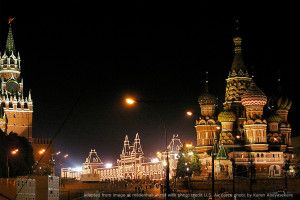Russian Pollster: Kremlin Nurtures Rising Anti-Americanism

(Voice of America – Victor Vasiliev – October 15, 2015)
Russians continue to characterize their country’s relations with the United States negatively. The latest survey by Russia’s biggest remaining independent polling organization, the Levada Center, found that a majority of the population believes U.S.-Russia relations are either “tense” (45%) or “hostile” (29%).
The poll was conducted in early October 2015 among 1,600 people in 46 of Russia’s 85 regions.
Anti-American sentiment in Russia has been rising steadily, according to the Levada Center. “The view that the United States plays a negative role in the modern world has always prevailed among the (Russian) population, but it is higher now compared to the ‘pre-Ukraine’ indicators: 71 percent in October 2015 compared to 50 percent in September 2013,” it noted on its website.
Only a fifth of the respondents departed from this unambiguous assessment of the United States, calling U.S. actions “sometimes positive, sometimes negative.”
Views of the European Union were also negative. Forty-two percent of respondents said they believe that Russia-EU relations are “strained,” while 32 percent described them as “cool.” However, the number of those giving a “hostile” assessment of the EU was almost two and a half times lower than those who negatively assessed the U.S. role in the world.
Voice of America discussed the survey with The Levada Center’s director, Lev Gudkov.
Victor Vasiliev, VOA: What is mainly responsible for the negative attitude of Russians toward the policies pursued by the United States?
Lev Gudkov: Above all, the propaganda conducted over the last several years. This trend began with [President] Vladimir Putin coming to power, and increased notably after 2007 following his speech in Munich when the path toward confrontation with the West was clearly taken.
It received a new impetus after the emergence of a mass protest movement (in Russia), with the Kremlin’s response to a drop in support for Putin, growing irritation and frustration with him, the president’s loss of a significant portion of his legitimacy, the loss of confidence and so on. It was precisely then, in late 2012, that a number of laws against civil society, the opposition and the free press were adopted.
VOA: What is the main aim of this policy?
Gudkov: The discrediting of all the basic values of democracy – freedom of speech, freedom of information, judicial independence, rule of law – which were shared by a very large part of the population. It has been the priority task of the Kremlin’s spin doctors and propaganda, and efforts to implement it acquired an incredible intensity after the Ukrainian Maidan (protest movement).
That was when, first of all, independent channels of information were suppressed, and secondly, extremely aggressive and demagogic propaganda was unleashed, which basically repeated the old main points, but (this time) in relation to Ukraine.
At the same time, they tried to focus the audience’s attention on the threat allegedly coming from the United States. Strictly speaking, anti-American notions never fully disappeared; they survived from the Soviet era in a “nascent” state. So it’s not a random thing and, of course propaganda would not be so effective in the country were this (anti-Western sentiment) not constantly present.
VOA: What about the West so annoys Russians?
Gudkov: The fact is our perception of the West is extremely ambivalent. On the one hand, the West is a somewhat utopian embodiment of everything that Russians themselves would like to have: freedom of movement, social protection, a high standard of living, welfare.
But, at the same time, people understand that is simply not possible under the current regime. Therefore, the deep frustration with this is transformed into the need to defend themselves and to remove the source of attraction. This is precisely what propaganda plays on.
VOA: To what extent does a policy of building anti-Americanism into a cult meet the national interests of Russia?
Gudkov: It is in the interests of the regime that is represented and personified by Putin. A corrupt, authoritarian regime is trying by all means to retain control over society, blocking any sources of information, any criticism, suppressing the opposition (and) independent civil society organizations. In short, it is neutralizing anyone trying to speak their own voice, anyone who wants to express their discontent with the policies of the Kremlin.
